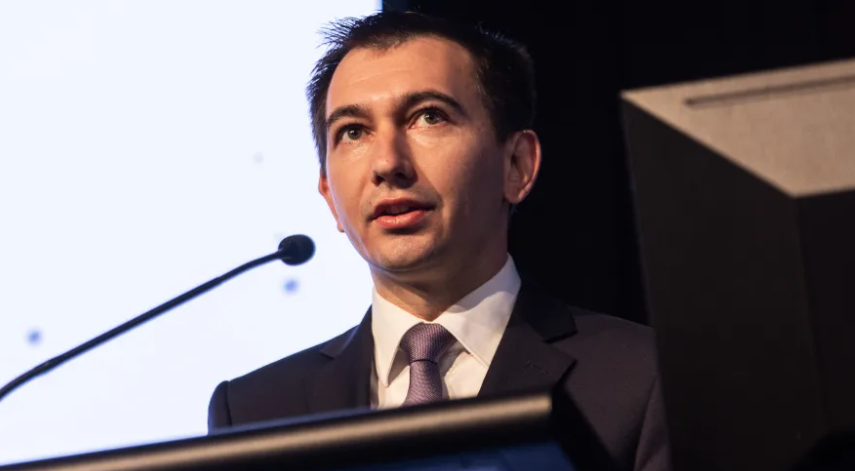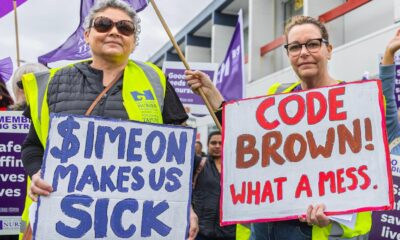Politics
Minister Considers Law Changes as Doctors Prepare to Strike

In a significant escalation of tensions between healthcare professionals and the government, Minister Brown has suggested possible legal changes in response to upcoming strikes by doctors. The strikes, set to begin on October 23, are part of a larger industrial action involving an estimated 100,000 workers, including nurses, dentists, and teachers, all protesting for better pay and working conditions.
Minister Accuses Doctors of Ethical Breach
During a speech at the annual conference for senior doctors, Minister Brown accused health professionals of “crossing an ethical line” with their planned industrial action, which he claims is negatively impacting patient care. He stated, “Multiple strikes have a long and hard impact on patients—the patients who they are there to serve.” Brown emphasized that it is the duty of medical professionals to prioritize patient welfare and criticized unions for pursuing strike action instead of engaging in negotiations.
In an interview with RNZ’s Morning Report, Brown reiterated his stance, expressing a preference for negotiations or arbitration over strikes. He criticized the unions for rejecting the government’s latest offer, which included a 5% pay rise over 16 months. “We have massive wait lists, which we are starting to see progress in reducing, thanks to the efforts of our doctors and nurses,” he said. Brown placed the responsibility for the current situation on the unions, claiming they are unwilling to resolve issues in a “responsible manner.”
Union Responds to Minister’s Claims
The Association of Salaried Medical Specialists (ASMS) quickly countered Brown’s allegations. Executive Director Sarah Dalton spoke with RNZ’s Checkpoint programme, asserting that the minister’s comments misrepresent the intentions of health workers. “Striking health workers have not forgotten about patients,” she stated. “In fact, that is a key driver in what is pushing our members to take strike action.” Dalton emphasized that ongoing workforce shortages are causing more patients to miss out on care than those affected by the strikes.
Dalton also pointed out that the union has attempted to re-engage in negotiations, having made two requests to Health New Zealand for talks in the past month, both of which were declined. She expressed frustration over the minister’s portrayal of the union as unwilling to negotiate.
The upcoming strike has been dubbed a “mega strike,” indicating its scale and potential impact on the healthcare system. With widespread participation from various healthcare workers, the action reflects widespread discontent with current pay and conditions in the health sector.
Minister Brown acknowledged the legal right to strike, but he suggested that if strikes continue, “that may well have to be considered” in terms of potential law changes concerning life services. He stated a desire to find a resolution to the ongoing issues affecting healthcare workers and patients alike.
The situation continues to evolve as both sides prepare for the challenges ahead. As the strike date approaches, the focus remains on finding a resolution that addresses the concerns of healthcare professionals while ensuring patient care is not compromised.
-

 World1 week ago
World1 week agoPrivate Funeral Held for Dean Field and His Three Children
-

 Top Stories2 weeks ago
Top Stories2 weeks agoFuneral Planned for Field Siblings After Tragic House Fire
-

 Sports3 months ago
Sports3 months agoNetball New Zealand Stands Down Dame Noeline Taurua for Series
-

 Entertainment3 months ago
Entertainment3 months agoTributes Pour In for Lachlan Rofe, Reality Star, Dead at 47
-

 Entertainment2 months ago
Entertainment2 months agoNew ‘Maverick’ Chaser Joins Beat the Chasers Season Finale
-

 Sports3 months ago
Sports3 months agoSilver Ferns Legend Laura Langman Criticizes Team’s Attitude
-

 Sports1 month ago
Sports1 month agoEli Katoa Rushed to Hospital After Sideline Incident During Match
-

 World3 weeks ago
World3 weeks agoInvestigation Underway in Tragic Sanson House Fire Involving Family
-

 Politics2 months ago
Politics2 months agoNetball NZ Calls for Respect Amid Dame Taurua’s Standoff
-

 Top Stories2 weeks ago
Top Stories2 weeks agoShock and Grief Follow Tragic Family Deaths in New Zealand
-

 Entertainment3 months ago
Entertainment3 months agoKhloe Kardashian Embraces Innovative Stem Cell Therapy in Mexico
-

 World4 months ago
World4 months agoPolice Arrest Multiple Individuals During Funeral for Zain Taikato-Fox















